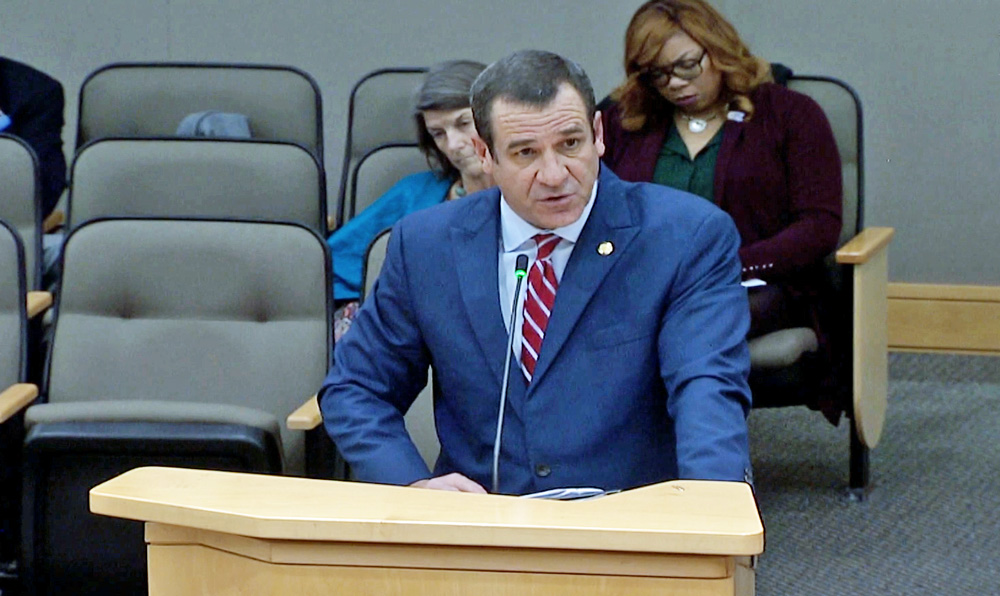
Ten years after granting Flagler County and other local governments authority to regulate vacation rentals, Florida lawmakers are poised to sharply constrain that authority by removing occupation limits, capping inspection fees, and further defining vacation rentals less as businesses than as residential properties indistinguishable from single-family homes in residential neighborhood.
The House Commerce Committee today approved a bill on a 10-4 vote pre-empting most vacation-rental authorities to the state while grandfathering in all pre-2011 vacation-rental ordinances, such as Flagler Beach’s. The bill heads to the House floor for a vote and reconciliation with the Senate’s version. It is the closest a pre-emption proposal has come to enactment in the dozen years that the vacation rental industry has pushed them. (See HB1537 here, the bill’s legislative analysis here.)
Starkly, no industry representative appeared before the committee today, just as had been the case at some previous committee stops. Those who spoke from the floor did so in opposition to the bill–government association representatives, local elected officials, neighborhood residents. Clearly, the vacation-rental industry is confident that the lawmakers it has lobbied and to whom it has contributed campaign funds will carry its waters.
The main difference between the House and Senate versions is fees: the House version caps inspection fees at $150, an amount that would make it difficult for Flagler County to carry out inspections without general fund supplements. The initial registration and inspection fee is currently $400 in Flagler. Annual renewal is $200 per rental.
“A similar form of this bill in the past has made its rounds over the last 12 years,” bill sponsor Philip Griffits Jr., the Panama City Republican, said. “While this bill is not totally perfect, it defines the roles of local, state and private industry while respecting the property rights of the free people in the state of Florida.”
The House and Senate bills both allow for occupancy regulation. “Occupancy is the driving force between the problems that we have with the vacation rentals–noise, trash and parking: that derives from occupancy,” Griffits said. “If you can control the occupancy, you can control most of those folks.” He said “bad actors” are few. “The tools that are in the locals’ pockets, parking, noise, trash and occupancy are all still there. Now they’ll have the ability to check into a statewide registry as a general public to find out if your neighbor is doing everything aboveboard.”
But there’s a poison-pilled caveat. Occupancy limits are allowed to be spelled out in local ordinances, but any local regulations must be “uniformly applied without regard to whether the residential property is used as a vacation rental,” the bill states. In other words, says Flagler County Attorney Al Hadeed, who wrote Flagler County’s vacation rental ordinance after the 2014 restoration, “if you do not promulgate an occupancy limit over all of the residential structures within your jurisdiction, then you may not enforce it against a vacation rental.” Discriminatory enforcement of the kind would invite a lawsuit that the county would lose.
Travis Moore of the Ocean Hammock Property Owners’ Association addressed the committee in opposition to the bill largely on occupancy grounds. Occupancy is limited to a maximum of 10 guests in Flagler County’s vacation rentals, with some properties free of that restriction because they were grandfathered in at the time the local ordinance went in effect.
“I don’t think anything subverts local government’s ability to exercise its police powers or health and welfare,” Patt Maney, the Okaloosa Republican and vice chair of the committee, said. “It frankly is a little frustrating for local government to beat us up over preemption when they don’t do their job and exercise their police powers. They have the police powers to control noise, to control trash and garbage, to control parking, and if they won’t do it, they shouldn’t complain when the state decides to get an eight or 900-mile long screwdriver to tighten the screws. Having said that, there are lots of things I don’t like about this bill.” Though he voted for the bill today, he said he may not do so in a floor vote.
Dan Daley, the Broward County Democrat and a member of the committee, was opposed. He recalled the original preemption bill passing when he was on the Coral Springs City Commission, “and how quickly the legislature came back and undid that because of the significant blowback at home. It was actually pretty masterful,” he said, an unspoken reference to the fight Flagler County’s legislative delegation, led by Sen. John Thrasher and Rep. Travis Hutson, that helped undo the pre-emption bill. (Hutson has since become a strong supporter of pre-emption.)
“Ever since that that point,” Daley continued, “we have been trying to chip away at that. We’ve been trying to go back to that full on preemption. And it really is bothersome. It is. We talk so much about property rights, property rights, property rights. Awesome. How about my property rights? How about my freedom to not live next to a party house? How about my freedom to be able to go to bed at a decent hour, wake up, have breakfast, make my breakfast or make my kids’ breakfast and take them to school without having to be up all night listening to the house next to me throwing a party four nights a week. I don’t have a wife and kids, either, but–conceptually. My property rights: that’s what we talked about here, and letting the cities weigh and decide how to handle tourism.”
Sam Wagner, who represents the Florida League of Cities, said the bill is both superfluous–creating a registration program already in place locally–and ineffective: what enforcement mechanism the bill creates to take a non-complying vacation rental operator to task makes it virtually impossible to enact because of arcane timelines (Hadeed called them “Byzantine”) that all but make enforcement impossible.
House Speaker Paul Renner, the Palm Coast Republican, will now decide which bill to put on the floor for a vote–the House version or the Senate version. If the Senate version is approved without amendments, that’s the bill that then goes to the governor’s desk. If the House opts to vote on its own bill or the Senate bill with amendments, then the resulting bill goes to the Senate for reconciliation. “So the process is not over. There’s still the opportunity for changes,” Hadeed said.
Those opportunities are dimming.
![]()









